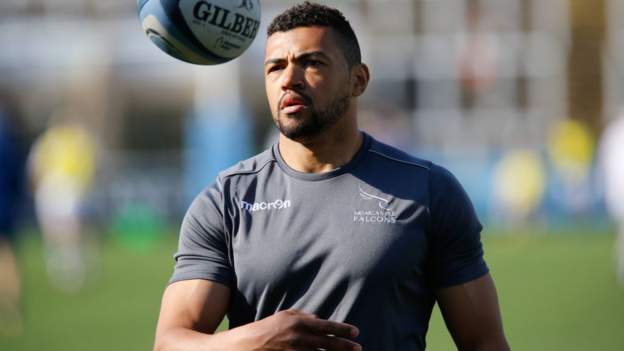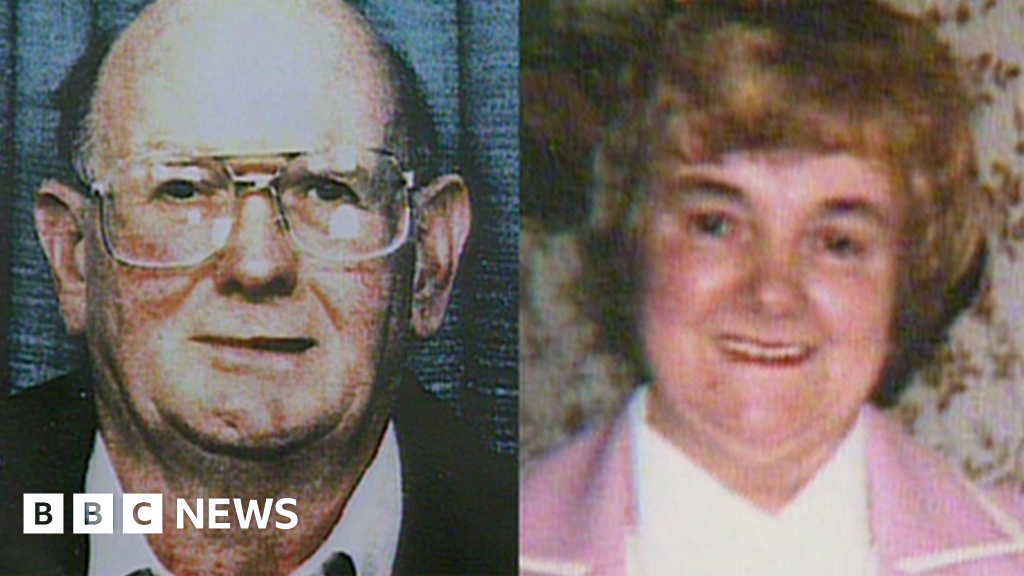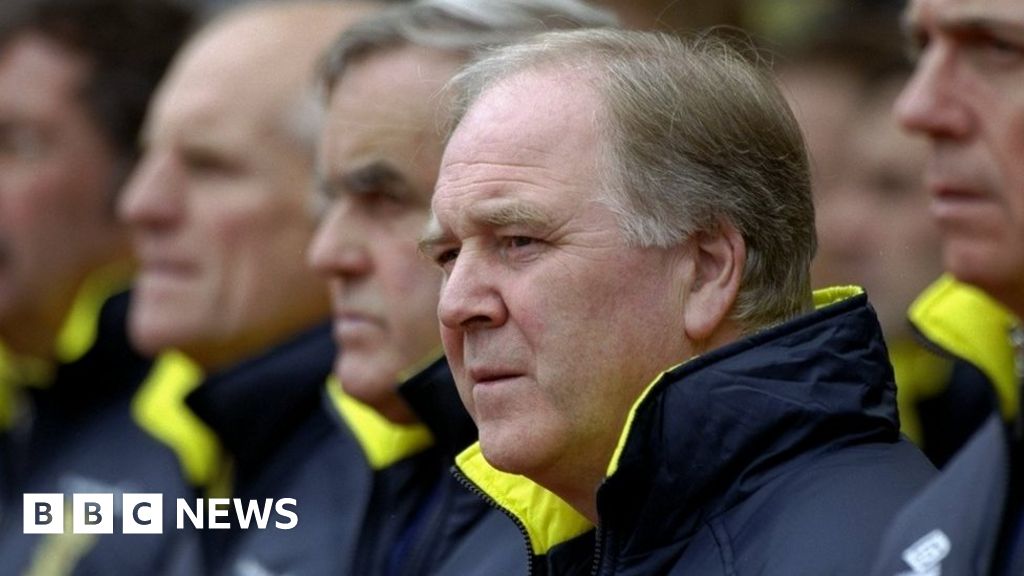[ad_1]
Former England centre Luther Burrell says he is “proud” and has “a sense of closure” after a Rugby Football Union investigation found his claims of racism in the sport were true.
The governing body says his revelations have prompted it to fast-track publication of a new strategy to promote inclusion in the elite game.
The RFU has also published the findings of research which found that “in every area of elite rugby, players had experienced some form of racism”.
Last year the governing body looked into Burrell’s allegations, taking over an inquiry launched by Newcastle Falcons – his final club.
The RFU says the report – published on Tuesday and in which no individuals are named – concludes his claims were true “on balance of probability” and that his evidence was “reliable”.
It says there is “insufficient evidence” to say all the abuse happened at Newcastle, apart from a player’s WhatsApp message “which contained a racist comment”.
But Burrell – who has not identified those involved – was also found to have suffered two further incidents of verbal racist abuse.
Newcastle have said these incidents were on a night out and on an away fixture, and that it had no access to the WhatsApp group. The club said the incidents “are more likely to have happened during his time with Newcastle Falcons than not”, but it was not made aware of them when they occurred.
The investigation report says: “The abuse was hurtful, undermined [Burrell’s] dignity, and clearly had an adverse effect on him. His motivation for making the allegations now was his wish to eradicate such racist behaviour from rugby union.”
It says it was “concerned over the lack of training” at Newcastle on equality, diversity and inclusion policies.
Speaking in his first interview since the investigation concluded this week, Burrell told BBC Sport: “Does it provide me with a sense of closure? I believe so, yes.
“It’s been a tough eight to 10 months. I was disappointed initially by the lack of support shown from some of my peers.
“It was as if my comments were being dismissed. It was almost like people needed proof, and now this has come out people will understand that what I was saying has been deemed to be the truth. And we can all hopefully move on and generate change. I’m proud of what I’ve done, and I’m proud of the support that I’ve had.”
‘Abhorrent’
Burrell, 35, who is of Jamaican descent, spoke out in June 2022 about his experiences, saying racist “banter” had become “normalised” among team-mates and that racism was “rife” in the sport.
“To call anybody a slave is not funny, so it was abhorrent behaviour. It was something that affects my dignity as a player, it affects me as a human as a father,” he said after being presented with the findings of the investigation.
The report said the RFU should consider launching a further disciplinary inquiry, but in a statement the governing body said it had chosen not to and “instead will continue to work with the club” to improve training and whistleblowing processes.
When asked why he had not identified those responsible for what he called “abhorrent” abuse, Burrell said: “This has not been a witch hunt.
“It’s not about retribution. This is about me finally having my voice heard. I’ve always said that this has ultimately not been about me, this has been about generational change within the sport.”
“I hope that they feel a sense of embarrassment that they publicly said that to me in a working space. However, this is not about me victimising them, because they have livelihoods, they have families.
“Do I hold hate or judgement for the persecutors? Not really no, because this racial ‘banter’ is complex.
“I have children and friends with children who love rugby, and I cannot be having them exposed to these micro-aggressions and perceived banter… and I hope from here on this will be removed from the professional environment and the grassroots.”
‘Brutal banter’
The investigation interviewed 93 current and former employees of the club who were at Kingston Park during the 2020-21 and 2021-22 seasons when Burrell played for Newcastle.
The report also concluded:
- “There was support for what [Burrell] alleged in the evidence of at least two other employees” of Newcastle.
- “Other individuals suffered or witnessed discriminatory behaviour.”
- “There was other inappropriate behaviour including two fights on two separate occasions involving players at the club.”
- “Many of the employees stated that culture at the club was good, however, there was ‘banter’ between players which was sometimes harsh, even brutal” and that “the appropriateness of this banter needs to be considered by the club.”
- “Almost all senior coaches and players confirm that there had been no equality, diversity and inclusion training or education on safe social media use.”
“I’ll be keeping a close eye on how the club evolves,” said Burrell. “I know that they have implemented new structures.
“We’ve got a lot of work to do to eradicate these feelings and these comments – and the cultural differences within rugby union as well. However, I believe it’s going in the right direction.”
‘Gravely concerning’
Newcastle said it was “gravely concerning” that anyone would be subject to discriminatory behaviour in rugby.
The club added: “It is incredibly disappointing to learn that any individuals have ever felt subject to discriminatory behaviour during their time with us and we want to make it very clear that we do not condone any discriminatory behaviour.
“Had any reports of this nature been made to HR or management they would have been dealt with in the appropriate manner.
“Given that after an extensive investigation there remains no way to identify those involved in any of the allegations outlined, and given that Luther’s stated aim was to educate and improve things for the future, going forward the club will be focusing on education and reinforcement of the aims and processes within our policies, as recommended in the report.”
Action plan
The RFU says a new action plan to tackle discrimination has been “accelerated in light of Luther’s experience”, and that research conducted last year found:
- “In every area of elite rugby – men’s and women’s, national team, clubs and academies – players had experienced some form of racism.”
- “Classism is an issue which affects the game and fuels an elitist perception.”
- “Reporting of incidents of discrimination is low across the elite game.”
- “The burden to call out poor behaviour and discrimination tends to land on under-represented groups.”
- “Efforts by the game to respond to discrimination to date, while well intended, have been either short-lived or perceived as performative.”
- “While there is a sense that discrimination is decreasing in the game broadly, this trend is moving at a slower pace for women and ethnically diverse communities.”
RFU chief executive Bill Sweeney said: “Luther was very brave to come forward and share his experiences of racism and classism in the game.
“To embed the change we all want to see following Luther’s frank and disturbing feedback to us about his experiences, requires collective action from all the major stakeholders in the English game.
“The findings from our research into racism and classism in rugby union have been revealing and have hardened our resolve to address and remove these forms of discrimination and experiences from our game and put inclusion at its very heart.”
After spells at Leeds Carnegie and Sale Sharks, Burrell spent seven years at Northampton Saints from 2012 to 2019, winning the 2013-14 Premiership title and making 15 appearances for England between 2014 and 2016.
He switched codes to play for rugby league side Warrington Wolves in 2019, before returning to union with Newcastle in 2020.
Burrell left Falcons in June, shortly after detailing his experiences of racism.
[ad_2]
Source link




